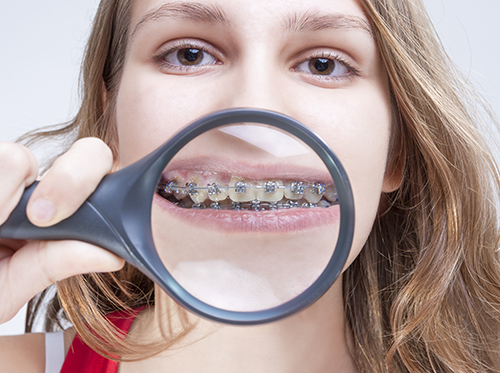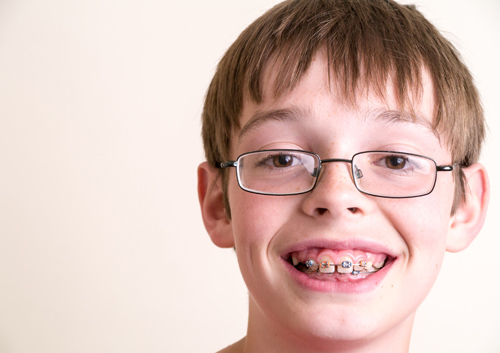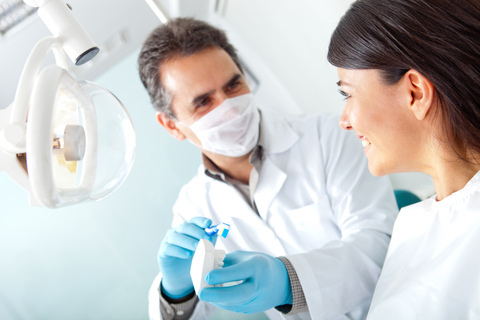September 5th, 2018

School can present a few issues when it comes to caring for your braces and mouth, since you won't have the luxury of the time and tools you have at your disposal while you're at home. But if you head to school prepared, you shouldn't have any trouble keeping your braces and mouth in great shape. Below is a list of helpful tips to care for your braces throughout the entire school year.
- Bring a kit that includes all of your oral health care items. This is a seriously smart thing to do and probably the most important of all the tips. Pack things like a toothbrush, floss, wax, retainer case (if needed), a mirror, a small cup for rinsing, a small bottle of water (if you don't already have some water with you), and some OTC pain medicine or a natural pain remedy. Keep the kit in your locker or backpack. Having all these items on hand will save you a lot of trouble and discomfort, and also ensure you don't have anything unsightly stuck in your braces or teeth!
- Take advantage of breaks and lunchtime. After eating lunch is a great time to pop into the restroom and give your braces and teeth a once over to make sure you don't have any food debris caught in them and to tend to any sore spots. If you've just had your braces adjusted, you may have soreness on your gums or cheeks. This is where the wax you packed will come in handy.
- Eat the right food for your braces. Avoid all the foods that wreak havoc on your braces like gum, candy, popcorn, hard chips, apples which aren't cut into wedges, nuts, beef jerky, ice, etc. You know the foods we're talking about; you've heard it enough already. Steering clear of these foods will help you prevent any possible mishaps with your braces, like breaking a bracket or wire, which is the last thing you want happening at school.
If you follow these tips and also keep up on your oral health routine at home, you'll be maximizing the effectiveness of your braces and making them as comfortable as possible. Do you have questions about caring for your braces during the school day? Ask Dr. Syrah Quraishi or anyone in our Indianapolis office and we'll gladly help you out!
August 29th, 2018

Labor Day is upon us, and that means the non-official end to summer. Before the kids head back to school and temperatures start to cool down, this is your last chance to barbeque in the beautiful Indianapolis community, head to the lake, and wear your favorite pair of white pants.
About Labor Day
Each year, Labor Day is celebrated on the first Monday of September. It is the one day of year Americans celebrate their achievements in work, which the US Department of Labor says has contributed to prosperity and well-being of America as a whole. Americans have been celebrating Labor Day since the 1880s, and today it is an official federal holiday.
Interesting Facts About Labor Day
- Every year, more than 30 million Americans travel over Labor Day weekend.
- Canada was the first to celebrate Labor Day, and the US soon followed.
- President Cleveland made Labor Day and official US holiday in 1894.
- Labor Day marks the beginning of the NFL and NCAA sports seasons for fans.
- Labor Day marks the end of hot dog season, when Americans consume seven billion hot dogs.
Thanks for being a valued patient of our Orthodontic office. Our staff would like to wish you a safe and happy Labor Day weekend. Enjoy your time off!
August 22nd, 2018

The average age of individuals who get braces is between nine and 14, although it is appropriate for younger children to visit Premier Orthodontics for a consultation with Dr. Syrah Quraishi. While parents may be concerned about the efficacy of early orthodontics, research suggests that early intervention can prevent greater dental health problems later in life.
What types of conditions require early intervention?
According to the American Association of Orthodontists, 3.7 million children under the age of 17 receive orthodontic treatment each year. Early intervention may be appropriate for younger children with crooked teeth, jaw misalignment, and other common issues. Early orthodontic treatment may be of use for several types of problems:
- Class I malocclusion. This condition is very common. It features crooked teeth or those that protrude at abnormal angles. In general, early treatment for Class I malocclusion occurs in two phases, each two years long.
- Class III malocclusion. Known as an underbite, in which the lower jaw is too big or the upper jaw too small, Class III malocclusion requires early intervention. Because treatment involves changing growth patterns, starting as early as age seven is a smart choice for this dental problem.
- Crossbite. Crossbite occurs when the upper and lower jaws are not properly aligned. An orthodontic device called a palatal expander widens the upper jaw, allowing teeth to align properly. Research suggests that early treatment may be beneficial in crossbite cases, especially when the jaw must shift laterally to correct the problem.
- Tooth extraction. That mouthful of crooked baby teeth can cause problems when your child’s permanent teeth erupt. For kids with especially full mouths, extracting baby teeth and even permanent premolars can help adult teeth grow in straight.
Considerations when thinking about early intervention
Early intervention isn’t helpful for all conditions. For example, research suggests that there is little benefit to early orthodontics for Class II malocclusion (commonly known as an overbite). Instead, your child should wait until adolescence to begin treatment. Scheduling a visit to our Indianapolis office when your child is around age seven is a smart way to create an individualized treatment plan that addresses unique orthodontic needs.
August 15th, 2018

If you’re brushing your teeth twice a day during your orthodontic treatment, Dr. Syrah Quraishi and our team think that’s wonderful! But, don’t forget that it’s also important for you to visit your general dentist every six months, or as recommended, in addition to brushing your teeth and flossing. (And visiting Premier Orthodontics for regular adjustments, of course.)
Dental checkups are crucial for maintaining good oral health. Your general dentist can check for problems that might not be seen or felt, detect cavities and early signs of tooth decay, as well as catch and treat oral health problems early. During an oral exam, your dentist can also check the health of your mouth, teeth, gums, cheeks, and tongue. Checkups will also include a thorough teeth cleaning and polishing.
If you have not been to the dentist in the last six months, let us know during your next adjustment visit and we will provide a few great references in the Indianapolis area!




 Website Powered by Sesame 24-7™
Website Powered by Sesame 24-7™